James Davis Nicoll on Five Doomed Armies in Science Fiction
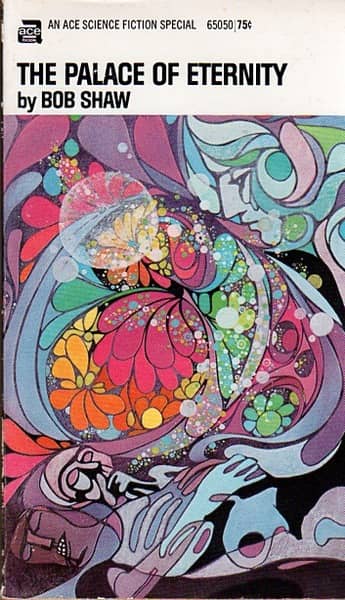 |
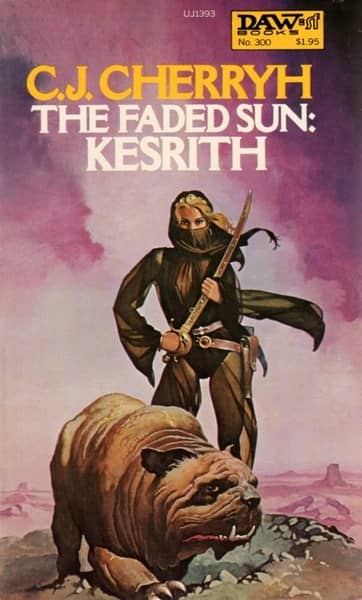 |
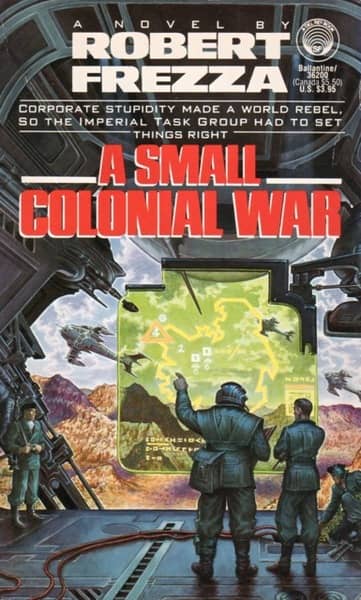 |
The Palace of Eternity by Bob Shaw (Ace Books, 1969), The Faded Sun: Kesrith by C. J. Cherryh (DAW, 1978), and A Small Colonial War
by Robert Frezza (Del Rey/Ballantine, 1990). Covers by Diane Dillon and Leo Dillon, Gino D’Achille, and Stephen Hickman
I’ve been enjoying James Davis Nicoll’s recent gaming articles at Black Gate, shotgun surveys of the best and worst of vintage role role playing. They’re quick reads, and if you have any nostalgia (or curiosity) at all about RPGs of the 80s and 90s, I think you’ll enjoy them.
Ten RPG Moments of Awesome
Ten WTF Moments from Classic RPGs
Stormbringer, Stargates, and Fighting Sail: Ten Classic Unplayed RPGs
I’ve also been enjoying his regular book column at Tor.com, for much the same reason. James is an entertaining writer, but he also has an uncanny knack for highlighting some fascinating vintage SF, a lot of which is new to me.
Take his July 2 article “Five Doomed Armies in Science Fiction,” which showcases novels from 1969-1989 by Bob Shaw, C.J. Cherryh, Joe Haldeman, David Drake, and Robert Frezza. You gotta admit that’s an interesting angle on classic SF. Here’s a tasty excerpt.
[Click the images for doomed versions.]
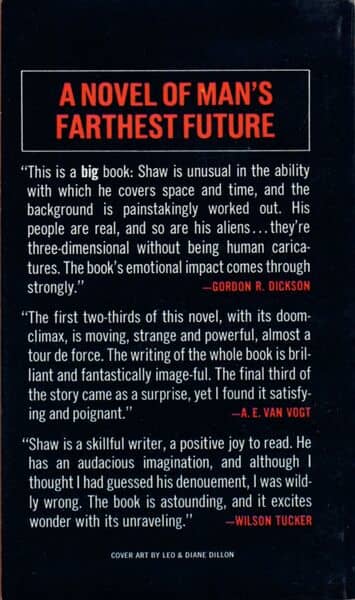 |
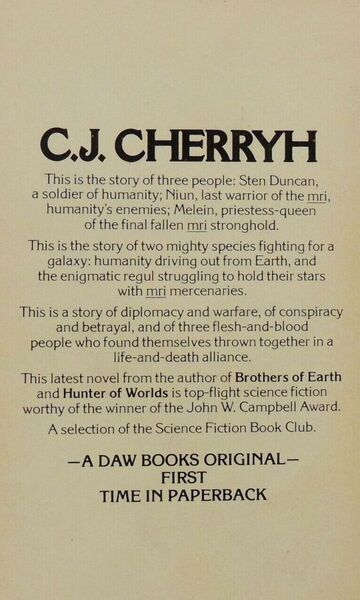 |
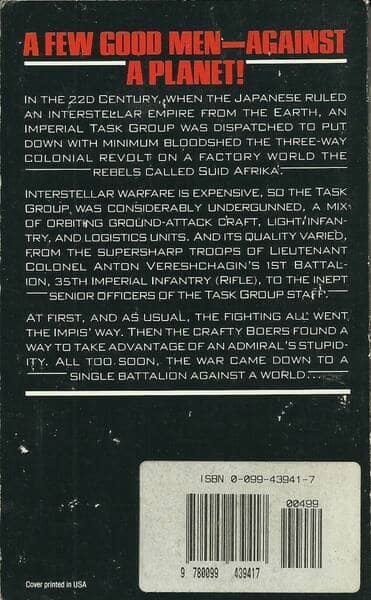 |
Back covers of The Palace of Eternity, The Faded Sun: Kesrith, and A Small Colonial War
Armies sacrificed for no obvious purpose and meaningless wars are not entirely unknown in speculative fiction. Here are five examples from that golden age of such stories, the Vietnam War era, and its literary aftermath.
The Palace of Eternity by Bob Shaw (1969)
Advanced civilizations are rare and short-lived. Hard luck for humanity that they share the Milky Way with the Pythsyccans, who, aside from their curious lack of Bussard ramjets, are otherwise the equals of humans and for reasons unexplained, implacably hostile to the human species. Mack Travener threw himself into the war effort—then, embittered over the futility of the conflict, tried to reinvent himself as a civilian mechanic on the backwater world Mnemosyne.
His efforts to put the war behind him are doomed; while conventional interstellar craft cannot approach the debris-shrouded planet, the war most certainly can. Mnesmosyne’s artists will be pushed aside so the planet can better serve the war effort. Mack himself will be drafted into a central role in the human-Pythsyccan conflict… but first he will die.
Some of James’s more interesting recent articles include:
Planets on the Move: SF Stories Featuring World-Ships
Five SFF Works Inspired by RPGs
A Brief History of the Megastructure in Science Fiction
Five Strategies for Hiding a “Lost” Civilization
Read the complete text of “Five Doomed Armies in Science Fiction” at Tor.com here.
Frezza’s trilogy is one of my all time favorites. Great characters, great action, interesting world building, it has it all. One of the unique aspects is several of the characters die, just as in real life.
I read all three of those novels back in the ’80’s/90’s. They are great books and you can still find Bob Shaw and CJ Cherryh’s work available in eBook form but not as far as I can tell Robert Frezza. As I recall he only wrote the Small Colonial War Saga and a couple of unrelated works before falling off the radar.
On James Nicoll’s Reviews website it is suggested he “…like so many other authors of this period, fell victim to the Great Del Rey Purge of the mid-1990s. ” I don’t know what that is but Lester Del Rey died in 1991 so perhaps there was a change in editorial direction.
> Frezza’s trilogy is one of my all time favorites. Great characters, great action, interesting world building,
> it has it all. One of the unique aspects is several of the characters die, just as in real life.
Terry,
I’m completely unfamiliar with it. I didn’t even know it was a trilogy until I checked the publication details at ISFDB.
Sounds like a great topic for a Vintage Treasures post!
> On James Nicoll’s Reviews website it is suggested he “…like so many other
> authors of this period, fell victim to the Great Del Rey Purge of the mid-1990s.”
I don’t know what that is either. To the Bat computer!
[I will ask James.]
Aw, there used to be a great article on this but the site seems to be gone. Basically, after Judy and Lester died, the new management did a major revamp of their line. Authors like Frezza, Gilliland, McCollum, Killough, Watt-Evans, and others were shown the door. Some went to other companies, some started their own, and some vanished.
Thanks, Jim. Publishing is filled with stories like that. I remember the end of Bantam Spectra the same way.
Sad really – I know the 1990’s saw a demise of the mid range Sci-Fi/Fantasy publishing houses as they were sucked up by Penguin,Simon and Schuyster etc.
The end of an era really and it has left us with a homogenized genre of sci-fi and fantasy. I don’t think it is a conspiracy as was peddled at the Hugo’s in recent past years, just big business being risk averse.
Of course we always have Black Gate to remind us of the past glories of Science Fiction, Horror, Fantasy and RPGs etc. and we can always get out of print novels from Alibris!
And Audible – I just downloaded the Mis-Enchanted Sword by Lawrence Watt-Evans
I found this on Lawrence Watt-Evans website. It sounds like Del Rey was the victim of bad management and loss of vision:
http://www.watt-evans.com/publishers.shtml
> The end of an era really and it has left us with a homogenized genre of sci-fi and
> fantasy. I don’t think it is a conspiracy as was peddled at the Hugo’s in recent past
> years, just big business being risk averse.
dmont7,
Looking at the history of SF through a wider lens, I think there have constantly been periods of creative, exciting publishing, followed by retrenching and a return to safer, more commercial havens.
Don Wollheim at Ace set the mold for most of 20th Century SF, before he left for DAW. In the 90s it was Lou Aronica and Bantam Spectra that were doing amazing, uncommercial work that rejuvenated the field.
Today I think it’s the smaller publishers, like Solaris and Angry Robot, taking chances on new authors and helping move the genre forward. And to be honest I don’t think the mainstream publishers — I’m thinking of Tor and John Jospeh Adams Books — don’t get the credit they deserve for supporting and promoting new authors. [I certainly benefited from that when JJA bought my first novel, THE ROBOTS OF GOTHAM, in 2018.]
> And Audible – I just downloaded the Mis-Enchanted Sword by Lawrence Watt-Evans
I love Audible. I listened to the Linesman series by S. K. Dunstall (great!), Warhammer 40k: The Magos by Dan Abnett (better than great), Sandman Slim by Richard Kadrey (okay), and The Saturday Night Ghost Club by Craig Davidson (pretty good).
I’ve slowed down a bit since I’m no longer taking the train into work two hours a day. But I’m currently listening to Blackwing by Ed McDonald and enjoying it very much.
I find I prefer being read to than reading myself these days. Maybe it’s because my ears are aging better than my eyes…. 🙂
> I found this on Lawrence Watt-Evans website. It sounds like Del Rey was the victim of bad management and loss of vision
Thanks for sharing that — I’ve never seen it before, and it made a fascinating read.
It didn’t seem to me to be a tale of a loss of vision, however. The death of Judy-Lyn del Rey was tragic, and it deeply impacted the company. But it sounds like Lawrence was a victim of a marketing misfire for his final trilogy, not a breakdown of editorial vision.
I’ve been reading SFF for almost sixty years and it seems to me the quantity and variety of material available is much greater than it was when I was young.
(I will give the Puppie this: their crap really made the less impressive stuff that got onto the Hugo ballot in the 1980s look good by comparison. Even They’d Rather Be Right does not look as bad as it did in 2014.)
Puppy? I have only been reading SF&F for about 30 years so sure I guess.
> Puppy? I have only been reading SF&F for about 30 years so sure I guess.
dmont7,
LOL. The Puppy reference wasn’t aimed at you. Up above you mentioned:
> I don’t think it is a conspiracy as was peddled at the Hugo’s in recent past years, just big business being risk averse.
The folks loudly complaining that the Hugo Awards have been homogenized (and who hijacked the awards in protest with their own slate) call themselves the Rabid Puppies (or the Sad Puppies) — collectively, the Puppies.
Their nominees for the awards were generally awfully. They included Black Gate on their slate both times, so I think we’re uniquely qualified to say, without any taint of sour grapes: the Puppy ballots were an unqualified embarrassment that the field is well served to forget. The were rejected en masse by voters at large, who voted nearly 100% of the ballot below No Award.
That’s what James meant in his comment about the crap offered up by the Puppies. It wasn’t meant to be dismissive of the taste of younger SF readers; quite the opposite, in fact.
Ah OK – I confess I follow the Hugos about as closely as I follow the Oscars which is to say not so much. I just remember something I read in the Guardian Newspaper some time ago about the controversy. I don’t recall mention of puppies.
dmont7,
I envy you that you’ve been able to forget the Puppies. The rest of working hard to get where you are.
My 35-40 year younger self loved the misenchanted sword…and most of L W-E’s stuff…Even his early Lords of Dus series…
IMNSHO, He suffered from the typical midlister problem of the 80s…you couldnt dependably find his stuff in bookstores, plus his ethshar setting books seemed to be going in the opposite direction of what fantasy/SF was doing in the late 80s…they seemed to be getting shorter and more compact, while Chee-huah-huah killers were becoming the norm…combine that with publisher issues, and he got lost in the maelstrom.
As for the puppies, they committed a great and unforgivable sin…they pointed at, then fun of, the emperor’s new clothes
> IMNSHO, He suffered from the typical midlister problem of the 80s…you couldnt dependably find his stuff in bookstores…
TW,
I think you’re right. I also recall being lost every time I picked up the one of the volumes in his 14-book fantasy series. They looked interesting, but I had no idea if they could be read separately, or even which volume was first. It was easier to just put that book back and put up the fantasy debut next to it.
> plus his ethshar setting books seemed to be going in the opposite direction of what fantasy/SF was doing in the late 80s…
Ethshar? See, I had no idea his huge fantasy series (beginning with The Misenchanted Sword in 1985) was called Legends of Ethshar until I just looked it up now at IMDB. For someone who pays as much attention to epic fantasy as I do, that seems like an unforgivable marketing oversight.
> As for the puppies, they committed a great and unforgivable sin…they pointed at, then fun of, the emperor’s new clothes
We’re just going to have to agree to disagree. If you’re going to displace tremendously qualified writers like Patrick Rothfuss, Ursula Vernon, Alyssa Wong, and many others, and cram the ballot with inferior SF written by yourself and your friends, or people you publish (Vox Day, John C. Wright), voters aren’t going to take you seriously.